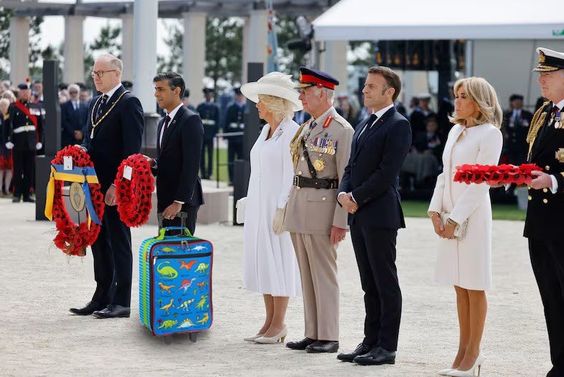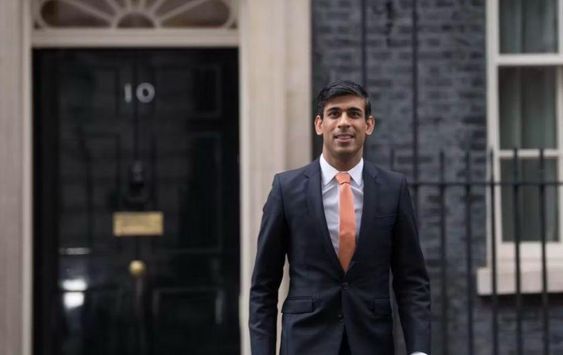


Never forget that Rishi Sunak bragged about taking money from the deprived ‘urban’ areas to fund the rich areas. pic.twitter.com/y0KtlP9baV
— Mukhtar (@I_amMukhtar) October 24, 2022
Rishi Sunak – The Movie🇺🇸 pic.twitter.com/h0BRsdrvEs
— Led By Donkeys (@ByDonkeys) June 4, 2024
First published on October 25. 2022 – updated with Rishi Sunak The Movie from Led by Donkeys on June 7. 2024
How can wealth persuade poverty to use its political freedom to keep wealth in power? Here lies the whole art of Conservative politics in the 20th century.
Aneurin Bevan (1897-1960), In Place of Fear, 1952.
Bevan was the Labour Minister of Health and the chief architect for establishing the National Health Service (NHS). On July 5, 1948, the government assumed responsibility for all medical services, providing free diagnosis and treatment to all.
JAMES O’BRIEN: HOW THEY BROKE BRITAIN – AFTERWORD RISHI SUNAK:
ON 15 FEBRUARY 2024, the United Kingdom entered recession. Although the numbers were provisional and the margins were notably small, it was a source of particular and profound embarrassment for the former Goldman Sachs analyst, Rishi Sunak. But it was also entirely in keeping with the rest of his premiership. After becoming the fifth Tory Prime Minister in six years in October 2022, his first act had been to stand at the podium outside Downing Street and promise that he would reintroduce ‘integrity, professionalism and accountability’ to public life. His second, as we have seen, was to reappoint the dismissed and disgraced Suella Braverman as Home Secretary. Just over a year later, he would sack her himself after a series of episodes that even by Braverman’s pitifully low standards, stretch credulity in the remembering. The previous week had seen her describe homelessness as a ‘lifestyle choice’ and call for both the criminalisation of rough sleepers’ tents and civil penalties for charities that supply them. Her final act was to write an article for Rupert Murdoch’s Times, apparently in defiance of Downing Street, in which she accused the Metropolitan Police of bias in their policing of public protests. As the government minister with oversight of law enforcement in England and Wales, it was an extraordinary intervention to make. It was rapidly described as ‘unhinged’ by one government figure, and prompted another Conservative MP to tell the BBC: ‘The home secretary’s awfulness is now a reflection on the prime minister. Keeping her in post is damaging him.
Victoria Honeyman, University of Leeds
Few were surprised when Rishi Sunak lost to Liz Truss in the first Conservative Party leadership race of 2022. Many of the people given a chance to choose between the two candidates blamed Sunak for Boris Johnson’s downfall. They also preferred Truss’s “optimistic” economic policies to Sunak’s somber assessment of the fiscal outlook. Where she promised generous tax arrangements, he argued that financial circumstances would be challenging and taxes could not be cut in the short term. Indeed, he warned, they might even have to rise.
A few weeks later, Sunak took over from Truss, vindicated for criticizing her tax plans. In the end, he was the only candidate to secure enough nominations to become the leader of his party and, therefore, the prime minister—a state of affairs partially driven by the need to avoid another divisive leadership contest. The Conservatives could not afford to continue projecting an image of disunity and chaos.
Johnson briefly ran for the job before announcing that he didn’t believe it would be right for him to return now. We may never know if, as he claimed, he had enough nominations to stand.
Penny Mordaunt was a more credible candidate but an unlikely winner because of her lack of experience. Her failure to garner enough nominations to run in the leadership election left the way clear for Sunak.
Who is Rishi Sunak?
Sunak is, in many ways, a very traditional Conservative. He was born in Southampton and attended Winchester School – a costly and well-respected private school. He studied at Oxford and Stanford and worked in the financial sector for Goldman Sachs. After graduating, he spent a few years living and working in Silicon Valley, where he met his wife, Akshata Murty, the daughter of N.R. Narayana Murty, an Indian billionaire.
Sunak only entered parliament in 2015, taking the safe seat of Richmond in North Yorkshire – a very Conservative county – succeeding former party leader William Hague. He was largely unknown outside the party until 2020 – a new MP making his way into parliament, impressing people but not holding high office.
However, things change quickly in politics, and the resignation of Sajid Javid in February 2020 left an opening in government. Johnson handed Sunak the chancellor job – one of the most significant state roles in the UK. His honeymoon in the role was cut short by the arrival of COVID. Sunak not only had to deal with the financial impact of a pandemic but was also tasked with appearing on television practically daily to update the country on his decisions.
Despite the pressure, Sunak turned the situation into a personal success. He was widely credited and praised for the furlough scheme, which saw the government pay the wages of people unable to work because of lockdowns. Forgotten are the many days during which Sunak was accused of dithering about whether to introduce such a scheme in the first place.
Sunak’s popularity soared as people felt that his actions spared them from the worst economic effects of the pandemic. Still, with vaccines rolling out and the return of something like everyday life, questions began to be asked about how Britain would recover economically.
This coincided with huge problems for the government. Johnson was exposed as having broken lockdown rules and was fined by the police. Sunak was also fined but escaped the level of criticism leveled at Johnson because people appeared to genuinely believe that he inadvertently ended up at an illegal office gathering on his way to a meeting. This was the kind of story peddled by Johnson at the time but was somehow more credible coming from Sunak, a man who seemed to have strived to genuinely help people rather than one who appeared to have no regard for rules generally.
In a telling reference to this time, Sunak wrote in his first statement after winning the leadership contest that his administration would be characterized by “integrity, professionalism, and accountability at every level.”
The United Kingdom is a great country but we face a profound economic crisis.
That’s why I am standing to be Leader of the Conservative Party and your next Prime Minister.
I want to fix our economy, unite our Party and deliver for our country. pic.twitter.com/BppG9CytAK
— Rishi Sunak (@RishiSunak) October 23, 2022
More damaging were revelations that Sunak’s wife was claiming non-domiciled tax status. Before this scandal, Sunak had been considered the most obvious successor to Johnson, but the optics of a chancellor allowing his own family to sidestep tax rules stopped him in his tracks.
Johnson’s fall, Truss’s rise
In July 2022, Javid (who had returned as health secretary) and Sunak resigned almost simultaneously, triggering a flood of further resignations from their colleagues.
The decision ultimately forced Johnson to resign, and the Tory membership is yet to forgive or forget, opting for Truss when given a vote in the summer. Meanwhile, the parliamentary party had always preferred Sunak, so when Truss’s short tenure came crashing down, they avoided asking members by coalescing around their preferred candidate.
Now, in the post, Sunak has a big job to do. The financial situation in the UK when he resigned as chancellor was already bad. Two months followed inaction while the Conservatives made up their minds about their new leader. Then Truss’s mini-budget tanked the economy. Coupled with the global impact of the war in Ukraine, a cost-of-living crisis, rising interest rates, and concerns over the UK’s financial stability, Sunak faces a difficult time in office.
Sunak has to pull his party together, knowing that even if he was the first choice of many, some preferred other candidates – including Johnson. Meanwhile, the Labour Party is riding high in the polls, and the potential solutions to the economic crisis will be painful and slow to make a difference.
How will Sunak take the Conservatives to victory in the next general election, due before the end of 2024 (or the beginning of 2025 at the latest), if the electorate feels the effects of higher taxes, higher energy bills, and stagnating wages? His only hope is to distance himself from the more damaging parts of the Conservative legacy – such as the current state of the NHS, industrial strikes, and chronic underfunding of public services – and associate himself with the more positive elements, such as a high level of youth employment.
Given recent events, his victory in the wake of Truss’s demise is no surprise. Perhaps the surprise is that anyone would want to be prime minister.![]()
Victoria Honeyman, Associate Professor of British Politics, University of Leeds
This article is republished from The Conversation under a Creative Commons license. Read the original article.




33 Comments
Pingback: Britain: Since 2010, five-year-olds have been showing signs of reduced growth, a likely symptom of policies that have led to impoverished lives - Bergensia
Pingback: หวยอภิโชค Apichoke เว็บเลขเด็ด หวยซองดัง Lottery
Pingback: Is Rishi Sunak a lame duck? With MPs divided and rebelling, a sense of decline hangs heavy in the air - Bergensia
Pingback: เว็บพนันบอล ฝาก ไม่มี ขั้น ต่ำ
Pingback: slotjili
Pingback: สมัคร yehyeh
Pingback: acessar outro pc remotamente
Pingback: college cornhole clubs and organizations
Pingback: สล็อต
Pingback: spin238
Pingback: คาสิโนออนไลน์ lsm99
Pingback: Red Tiger เกมค่ายนี้เล่นง่ายจ่ายหนักจริงไหม
Pingback: where to buy psilocybin mushroom
Pingback: you can try these out
Pingback: Angthong National Marine Park
Pingback: ks quik
Pingback: รับจำนำรถใกล้ฉัน
Pingback: เช่ารถตู้พร้อมคนขับ
Pingback: ร้านทำเล็บเจล
Pingback: safe eft cheat
Pingback: แทงบอล
Pingback: เค้กดึงเงิน
Pingback: luckyvip77
Pingback: Simpleplay บริษัทผู้พัฒนาเกมส์พรีเมียม
Pingback: cz 457 varmint precision chassis
Pingback: สติ๊กเกอร์ไดคัท
Pingback: สูตรสล็อตแตกหนัก
Pingback: free tokens
Pingback: Loi Kroh Muay Thai ticket
Pingback: devon rex
Pingback: free tokens
Pingback: รับจัดงานศพ
Pingback: JETSADABET